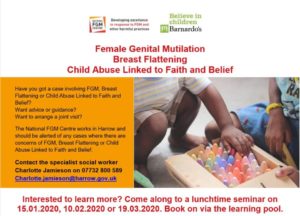FGM – Guidance
Female Genital Mutilation (FGM)
FGM is also known as female circumcision or female genital cutting. FGM is defined by the World Health Organisation as the range of procedures which involve the partial or complete removal of the external female genitalia or another injury to female genital organism whether forms cultural or any other non-therapeutic reason. It is a deeply rooted tradition which is practiced globally including countries in Africa, Asia and the Middle East. For more information regarding the prevalence rates of FGM please click here
FORWARD UK estimates that as many as 6,500 girls are at risk of FGM within the UK every year.
Different countries have different words for terms and words for FGM
FGM is believed to be a way of ensuring virginity and chastity. It is used to safeguard girls from sex outside marriage and from having sexual feelings. Although FGM is practiced by secular communities, it is most often claimed to be carried out in accordance with religious beliefs. FGM is not supported by any religious doctrine. FGM serves as a complex form of social control of womens sexual and reproductive rights. Procedures are mostly carried out on young girls sometime between infancy and age 15, and occasionally on adult women.
Short term health problems include severe pain, difficulty passing urine, bleeding, infection and death. For some types of FGM long-term problems include difficulty passing urine and long painful periods. For some types there may be a long scar, which can make sex and childbirth difficult. Recurrent infections can lead to infertility. Women ay also feel angry, depressed and suffer from post traumatic stress disorder.
FGM is a complex issue despite the harm it causes, many women and men from practicing communities consider it to be normal to protect their cultural identity, ensure their daughters marriageability and place within the community.
 If you are concerned about a child being at risk of FGM please contact Harrow MASH or the police if the child is felt to be at immediate risk of harm.
If you are concerned about a child being at risk of FGM please contact Harrow MASH or the police if the child is felt to be at immediate risk of harm.
The National FGM Centre is working in Harrow and should be notified of any concerns relating to FGM.
The health based lead professionals for Harrow are:
Grace Nartey-gracenartey@nhs.net
020 8869 5046/ Tel 07825606008
Florence Acquah- florence.acquah@nhs.net
Mobile: 07879444682
Tel: 0208 869 3692/3695/ Mobile: 07879444682
Mandatory reporting of FGM (multi agency responsibility) Procedural Information Download
FGM Helpline Email: fgmhelp@nspcc.org.uk
Telephone: 0800 028 3550
FGM Fact Sheet Download
FGM Pathway Plan Download
Multi-Agency FGM Guidelines Download
London FGM Procedures Download
The FGM resource pack has lots of excellent case studies and resources for sector specific professionals, leaflets to use in different languages. https://www.gov.uk/government/publications/female-genital-mutilation-resource-pack/female-genital-mutilation-resource-pack
The Department of Health has published a set of films about female genital mutilation (FGM) for healthcare professionals. Topics covered include: the impact of FGM on mental health; mandatory reporting; personal experiences of FGM and how healthcare professionals can support victims.
Further information: FGM resources for healthcare professionals
This new App has been created to help protect young girls and women from female genital mutilation (FGM). It includes: information about FGM; personal stories from those who have been affected; links to educational films; a quiz; and tips on how to get involved in campaigning to end the practice. It provides details of where those affected or at risk can go to get help and advice and provides access the NSPCCs National FGM Helpline at the touch of a button. It works across most mobile devices.
There is a free E-learning module on FGM powered by the Virtual College
If you are concerned that a British citizen may be taken overseas for the purpose of FGM please call the Foreign and Commonwealth Office FCO on 0207 008 1500 or email fgm@fco.gov.uk

